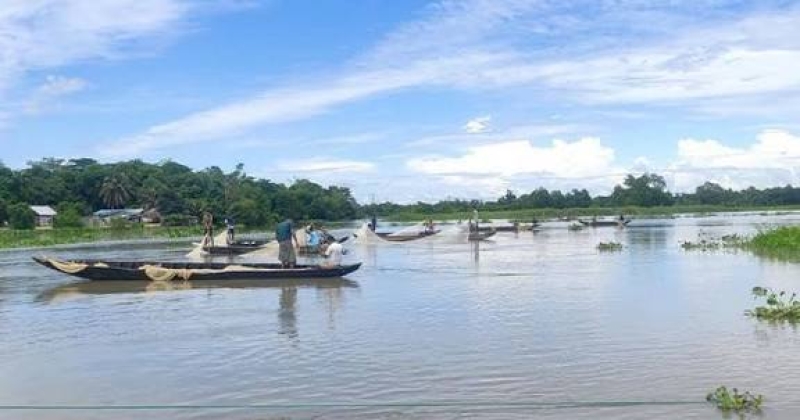- Five Shariah Banks to Merge Into State-run Sammilito Islami Bank |
- Dhaka’s air ‘unhealthy for sensitive groups’ Wednesday morning |
- US proposes that the UN authorize a Gaza stabilization force for 2 years |
- Democrat Zohran Mamdani is elected New York City mayor |
- Martyr Mugdha's brother Snigdha steps into politics with BNP |
Halda River declared as ‘Fish Heritage’; fishing banned

The government has officially declared the Halda River, Bangladesh’s largest natural breeding ground for carp fish, as the country’s first ‘Fish Heritage’ site.
A gazette notification in this regard was issued on Wednesday. It also imposed a complete ban on fishing and other harmful activities in the river.
From April to June, carp fish spawn naturally in various parts of the river, producing a large number of fertilized eggs.
Besides, this uniquely characterised river is a habitat for the critically endangered Ganges dolphin.
In order to ensure the safe breeding of carp fish through the conservation of the natural environment and the improvement of environmental standards and to preserve the habitat of the Ganges dolphin, the government has declared the 23,422.28059 acres of land covering 93,612 plots along the Halda River flowing through Ramgarh and Manikchhari upazilas in Khagrachhari and Fatikchhari, Raozan, Hathazari upazilas and Panchlaish thana in Chattogram, as the ‘Halda River Fish Heritage’.
The gazette notification also stipulates that certain conditions must be met for the utilisation of the Halda River from the date of its publication.
Those are:
· No fish or aquatic animals may be caught or hunted from the river. However, the Department of Fisheries may collect fertilized fish eggs during the breeding season under its supervision.
· No activity is allowed that destroys habitats of animals or plants.
· No work may be undertaken that alters or damages the river’s natural land or water features.
· Activities harmful to fish, dolphins or other aquatic species are strictly prohibited.
· Domestic, industrial or institutional waste—solid or liquid—cannot be discharged into the river.
· The river’s course may not be straightened or altered in any way.
· Fishing is prohibited in 17 canals connected to the Halda River during the breeding season (February to July).
· Construction of new rubber dams or concrete dams on the river or its connected canals is banned.
· No new water treatment or irrigation projects may withdraw water from the river without approval from the Halda River Fish Heritage Monitoring Committee.
· No domestic or foreign entity or individual may conduct research on the river or its aquatic life without prior permission from the Monitoring Committee.
· To ensure natural fish migration before spawning, no obstruction may be created in the river or its connected canals.
· Operation of engine-driven heavy vessels—including sand-laden and cargo boats or dredgers—is prohibited year-round from the Karnaphuli estuary to the Nazirhat Bridge (sanctuary area).
· Sand extraction or leasing of sand fields in the Halda and its tributaries is banned and dredging or harmful sand lifting is prohibited.· Tobacco cultivation in the river basin is not allowed.
· The use of harmful pesticides or insecticides in agricultural lands of the river basin is prohibited.
· Establishment of brick kilns near the riverbanks is not permitted.
It also states that for better environmental and ecological management, the Ministry of Fisheries and Livestock may, from time to time, impose new restrictions or make necessary amendments regarding boundary demarcation and related matters arising from changes in the river’s course, reports UNB.

